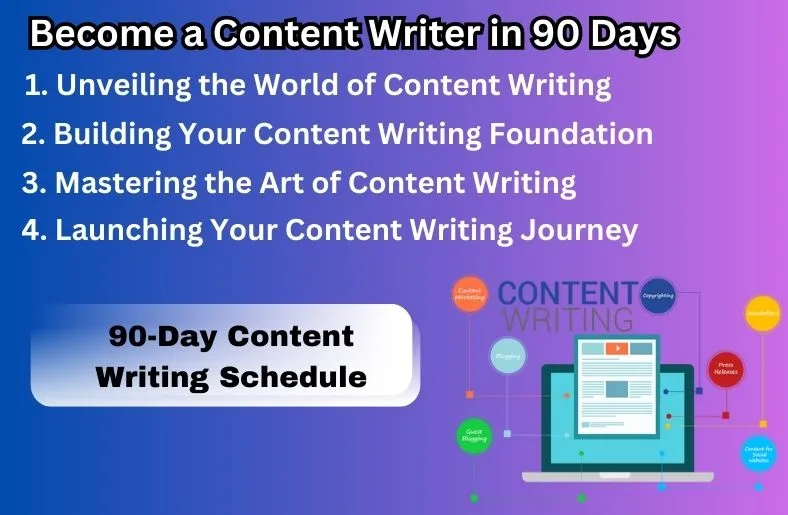Ever dreamt of turning your passion for writing into a fulfilling career? Content writing might be your perfect fit! This guide offers a practical roadmap to becoming a content writer within 90 days.
1. Unveiling the World of Content Writing
Ever dreamt of transforming your love for writing into a lucrative career that offers flexibility and creative freedom? Look no further than the exciting realm of content writing!
What is content writing?
Content writing is more than writing large paragraphs of text. It is the skill of creating attractive stories through gripping facts and knowledge that completely gets the audience interested and informs the readers. Consider yourself as a word-smith genius who makes stories that entertain and at the same time teach and motivate.
What actually is the work of a content writer?
They are the nameless authors of your website during your surf, your social media feed when you scroll or even the catching emails that hit your inbox. They write blog posts, website articles, social media captions, etc. and make sure that the audience can relate to the content and will get the exact result as expected from it.
Is content writing right for you?
If you are a person that likes writing, loves researching and can convey messages in a clear, concise manner, then you might enjoy content writing. Apart from this, it doesn’t limit the field of industries and niches that you can choose from, thus ensuring that you can find the one area that is in line with your interests and knowledge.
2. Building Your Content Writing Foundation
It’s time to hone your writing abilities and create a strong base for your content writing career. Consider it as building the foundation of your writing career, the stronger it is, the higher you may soar!
Sharpening your writing skills
Want to write like a pro? It all starts with practice! Here are some enjoyable daily practice ideas:
- Write in a journal: This is your secret notebook where you can write about anything you want, from your day to crazy stories.
- Start a blog: Share your hobbies and what you know with others. This is like your online playground to try different writing styles and make new friends.
- Join online writing groups: Hang out with other people who love to write. You can exchange work and useful advice with one another. This can encourage you to keep writing and give you more self-assurance.
Bonus Tip: Read lots of books and articles! This helps you learn from other writers and get new ideas for your own writing.
Developing your content creation strategy
Before beginning the process of developing content, an effective road map must be created! This is when your content creation strategy comes in handy. Think of it as your own personal guide to help you produce content that engages readers and furthers your goals.
This is what you must do:
- Know your audience: For whom are you writing? To create content that genuinely interacts with individuals, it is essential to understand their requirements, pain areas, and interests.
- Choose your niche: Avoid attempting to please everyone! Select a specialized field of knowledge where you can get credibility.
Once you’ve got the basics down, it’s time to outline your content creation process:
- Research: Investigate thoroughly and compile trustworthy data to back up your writing.
- Outline: Make sure your information flows naturally by organizing your thoughts.
- Draft and edit: Create content that is both creative and clear, then refine it to the utmost.
These guidelines will help you create valuable and interesting content that draws in your target audience and helps you achieve your content development objectives.
Essential tools for content writers

After refining your writing techniques and organizing your approach to content development, it’s time to provide yourself with the necessary resources for content creation success! Consider them as an all-in-one superhero toolkit that can help you increase the productivity of your content creation process.
Grammar helpers: These writing-related products, such as Grammarly, are comparable to spelling bee champions. They assist you in identifying errors and typos before others do.
Copy checkers: These handy checkers make sure your writing is all your own. They scan the web for anything that might look a little too similar to someone else’s work, so you can be confident your content is fresh and unique.
Task trackers: Feeling like you have a million things to do at once? Don’t worry, we’ve all been there! Tools like Trello and Asana are like your personal assistants for staying organized. They help you break down those big projects into smaller, more manageable steps, like baby steps for writing! Plus, you can easily track your progress and see how much you’ve accomplished.
Research buddies: When you read articles and visit websites written by professionals in your area, make notes. When looking for new information and facts, these will be the first locations you visit.
Take note that these tools emulate the training wheels when you write. They make a great beginning, but the ultimate beauty is that you will create by yourself, bringing together what you feel and fantasize. You’ll become a pro in content writing, if you’ll study it well and if you’ll use the right tools.
3. Mastering the Art of Content Writing
Now that you are done with improving your writing skills and the stage of building your writing fundamentals, it is time to learn how to use the artistic skill of creating compelling content.
Here are some key points :
Understanding Different Content Formats
The world of content writing provides a wide selection of formats to meet various preferences. You will encounter:
- Blog posts: These are informative articles published on websites, often covering specific topics in detail.
- Website copy: This is the written content that appears on websites, like product descriptions and landing pages.
- Social media captions: These are the short and catchy descriptions you see next to pictures on Facebook and Instagram, that grab your attention and make you want to click and see more.
- Email newsletters: These are electronic messages sent to subscribers to share updates, promotions, or valuable information.
Every format has a unique set of characteristics and guidelines. Being able to write in various formats is a great skill that gives you a chance to address your audience across multiple channels and deliver your message appropriately.
Conducting Effective Research
Before you write anything, it’s important to gather the best information possible.Here’s how to find the best information for your writing:
- Find reliable sources: To always get the latest and most accurate news you should consult credible magazines and scientific articles and websites of well-known professionals.
- Look up trending keywords: Use tools to find out what terms your audience is using, and always incorporate such words organically into your writing.
- Verify your information: Reliability should always be double checked before redistributing information to the public. This applies to all credible sources.
Creating Headlines and Introductions That Grab Attention
Conceive your headline as if it is your content’s banner, but with the main task of grabbing attention. It should be great enough to be read, concise and inviting enough to make the users desire to click and know more.
Keep in mind that proficiency in content writing requires commitment and practice. Try new things, grow from your errors, and most of all, have fun while doing it. If you apply these tips along with your own expertise, you definitely should not experience difficulty in the writing processes – creating high quality content that would satisfy your readers and enable you to achieve your writing goals.
4. Launching Your Content Writing Journey
Now that you’ve developed your writing abilities, created a successful plan, and mastered a variety of content types, you can finally begin your content writing journey! It’s time to turn your passion into a fulfilling job.
Creating Your Content Writing Portfolio
Treat your portfolio as a trophy case that displays your finest work to prospective employers and clients. This is how to create an amazing portfolio:
- Provide examples of the content: Provide outstanding material that is relevant to the chosen topic. This can include writing captions for social media posts, blog posts, and website copy.
- Showcase your versatility: Don’t be scared to experiment with various formats to show off your depth and flexibility.
- Select the appropriate platform: Your portfolio can be presented online in a number of ways. You can make a PDF document, use a platform such as Contently, or make your own personal website.
Finding Your First Clients

Finding your first clients can be like discovering a hidden gem, but don’t worry, there are several efficient methods for locating article writing jobs.
Freelance marketplaces: There are many different kinds of freelance writing possibilities available on websites like Upwork and Fiverr.
Job boards: Look for job postings related to content writing on Indeed or LinkedIn.
Direct outreach: Find companies or websites that fit your niche, then get in touch with them personally to let them know you’re interested in contributing content.
Never forget that first impressions count! Create effective proposals and cover letters that showcase your qualifications, expertise, and special selling point.
Tips for Improving Your Content Writing Skills
- To learn about other writing styles and hone your own, read novels, magazines, articles, and blogs.
- Develop good time management skills to fulfill deadlines and strike a balance between work and play.
- Maintain organization in your projects, deadlines, and client communications by using tools and strategies.
- Learn something new every day to keep current in the rapidly evolving world of article creation.
- To increase your prospects, network with other content writers, go to online events, and have a solid online presence.
Content writing success comes from implementing these strategies, maintaining a positive attitude, and constantly improving your skills.
90-Day Content Writing Schedule
Week 1-2:
- Research: Explore the content writing industry and potential niches (5 hours).
- Skills: Sharpen your writing skills through daily writing exercises (3 hours/day).
- Niche: Identify your target audience and define your content writing niche (5 hours).
- Tools: Choose and learn essential content writing tools (2 hours/day).
Week 3-4:
- Formats: Learn about different content formats and their best practices (4 hours).
- Process: Develop your content creation process (research, outlining, editing) (4 hours).
- Portfolio: Start building your content writing portfolio with niche-specific samples (5 hours/day).
- Clients: Research and identify potential clients or freelance platforms (3 hours/day).
Week 5-6:
- Portfolio: Refine and finalize your portfolio website or online profile (5 hours).
- Proposals: Craft compelling cover letters and proposals tailored to specific clients (3 hours/day).
- Connections: Start connecting with potential clients through networking and outreach (2 hours/day).
Week 7-9:
- Applications: Submit applications and proposals to relevant job postings or freelance platforms (2 hours/day).
- Interviews: Prepare for and attend interviews (variable time commitment).
- Negotiations: Negotiate your rates and terms of service (variable time commitment).
Week 10-12:
- Start work: Begin working on your first content writing projects (variable time commitment based on projects).
- Deliver work: Deliver high-quality content on time and meet client expectations (variable time commitment).
- Feedback: Solicit feedback from clients and continuously improve your skills (1 hour/week).
Week 13:
- Marketing: Continue to market yourself and network to secure new clients (2 hours/day).
- Learning: Dedicate time to ongoing learning and skill development (1 hour/day).
- Evaluation: Reflect on your progress and adjust your strategy as needed (1 hour/week).
Conclusion
You’re now prepared to take on your exciting content writing journey using the knowledge and resources provided by this guide. As always, practice, commitment, and a healthy dose of imagination are the ingredients that lead to success. Accept the process of learning and have fun on the trip instead of letting setbacks depress you! Your journey to become a content writing champion and transforming your love of writing into a successful career will be well underway as you steadily improve your abilities and gain more experience!






One thought on “How to Become a Content Writer in 90 Days”